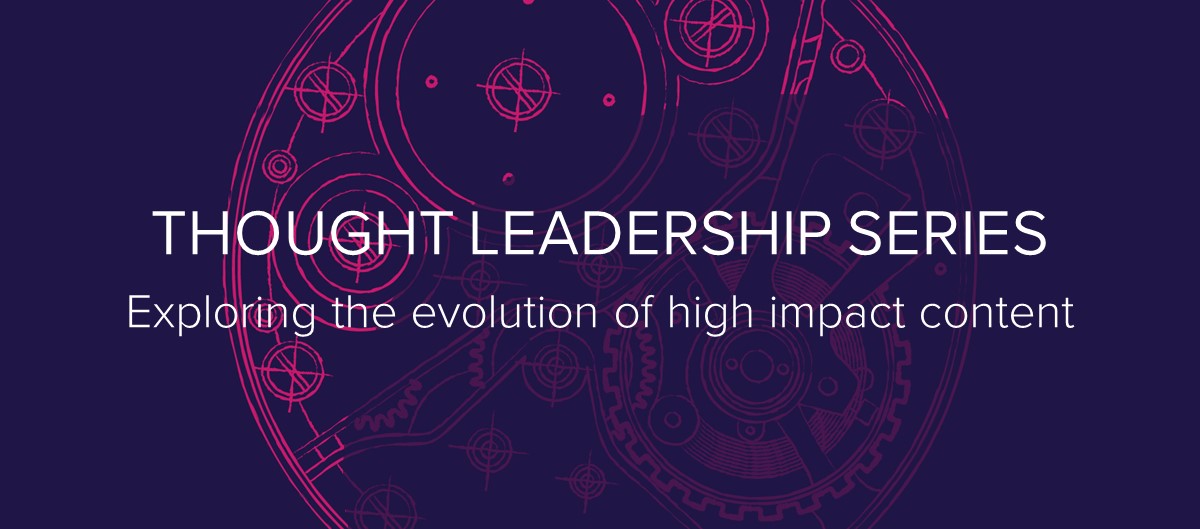Thought leadership in a challenging climate: What’s the formula for success?
April 30, 2020 • 6 minute read

As the economic outlook continues to shift, the power of thought leadership to generate competitive edge has become even more business-critical. In the second of our series on how professional services firms are connecting with their audiences and demonstrating brand value, we look at the essential elements to a successful campaign.
Thought leadership is an evocative term. It suggests that organisations engaging in it are forward-thinking market leaders who are at the forefront of shaping debate on relevant issues. It enables businesses to showcase the depth and breadth of their expertise, while opening up conversations with new and existing audiences. It lets them reach out and connect in creative ways, generating competitive advantage in the process.
No longer a ‘nice to have’
The global lockdown has meant that the touchpoints where potential customers come into contact with your brand – before, during, or after they engage with your business – have become much scarcer. Firms that have stayed away from using content to stand out are now being forced to compete with businesses that are far more experienced in the art.
Content that cuts through the noise and has a tangible, sustainable impact has never been more vital. But is there a formula for success? Our work developing powerful campaigns for corporate clients in the professional services sector highlights several critical factors:
- Authenticity matters. Today’s audiences are sophisticated and they can tell when a company is jumping on a bandwagon or trying to get its voice heard on a hot topic where they don’t have any real value to add. Professional services firms trade on their expertise, so focus on issues that really mean something to you as a business, whether it’s a key area of focus for existing clients or a new area you want to move into. Ask yourself, do we have an authentic “truth” and a legitimate voice to get involved in this debate? Remember that an organization that forgets its purpose creates content that’s not fit for purpose.
- Keep a tight focus. Don’t try and cover every base but be selective in the themes you choose to pursue. It’s better to “own” a few key topic areas and build up real presence as commentators on those, rather than spreading resources too thinly and failing to stand out.
- Stand out in what you say. Thought leadership must move the discussion forward, so find a different angle or approach or build upon the body of commentary that already exists in the marketplace with new ideas or exclusive insight. However, being distinctive is not the same as being controversial – take a contrarian view if you have a valid point to make, but support it with evidence and expert knowledge. Expect to be challenged if you challenge the status quo – but this may be no bad thing if it stimulates healthy debate.
- Get creative with delivery. It’s not just what you say but the way you say it that counts. Content can be packaged in many different ways: short, punchy blogs; podcasts including talking heads; thought-provoking opinion articles; infographics and animations; analytical, research-based reports or white papers; webinars and more. Audiences can pick and choose how they consume content via numerous different platforms, so making it multi-channel ramps up reach and appeal.
- Let talent set the tone. Many organisations now have a corporate “tone of voice” but for content to be truly engaging it needs some personality to stop it being bland. Choose key individuals who are knowledgeable, enthusiastic and present well to inform and/or deliver the content. Different spokespeople may suit different mediums – some may be better than others at audio or video, so choose accordingly but don’t forget that training can help (read our recent guide for more information on the topic). Crucially, this can all happen remotely – the recent shift to working from home means people are adapting and creating thought leadership outside of the traditional office environment.
- Leverage relationships. Consider creating intelligent partnerships or alliances with suitable third parties (for example by inviting them to do a guest blog, expert interview or podcast) to add interest and reflect positively on your brand. Since such tie-ups can be mutually beneficial, it could be a good way to reach out to new contacts and create new relationships. When done well, these partnerships can expose both brands to new audiences and potential customers.
- Start a conversation. Don’t just “push it out” and leave it at that – see it as a jumping-off point to stimulate debate and spark dialogue with the audiences you want to connect with. It should be integrated with the wider communications, marketing and business development strategy, and promoted using internal and external digital channels including the business’ and individuals’ social media. In these remote working times, it’s a way to involve staff, as well as clients and other targets, in an exciting campaign.
- Iterate over time. Adapt the content and the format to give you more “bites of the cherry”. Doing so strengthens engagement, builds traction and gives greater longevity to a campaign.
- Maintain momentum. Thought leadership is not a tap that, once switched on, guarantees you instant success. It is essential that your content is not sporadic if you are to regularly engage with new audiences and build their trust as experts in your field. Firms need to keep working and observing how their content performs in order to tweak and improve its effectiveness. Safeguarding brand value and goodwill are crucial to building resilience in tough times and capitalising faster when recovery comes.
Thought leadership can take many forms on many topics, but one thing that it shouldn’t be is static, especially not in today’s fast-changing world. In order to stay relevant and set professional services firms apart from the competition, content campaigns must continue to evolve, stay ahead of the issues and drive debate. That’s the mark of a true thought leader.
Need help creating unique, targeted engaging thought leadership? Infinite Global can help you develop a bespoke strategy to suit the needs of your firm, empower your stakeholders and connect with your audience.
